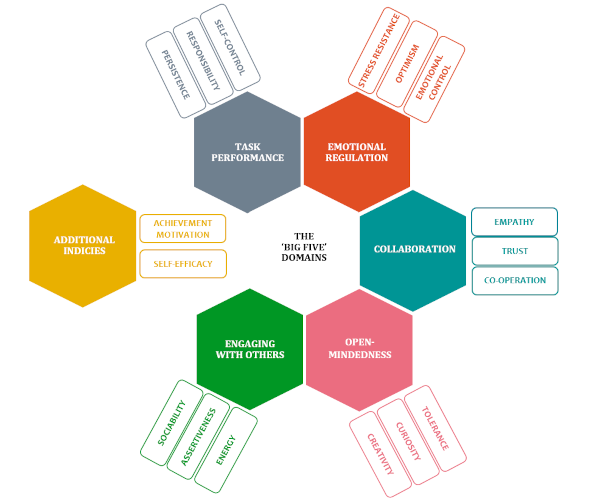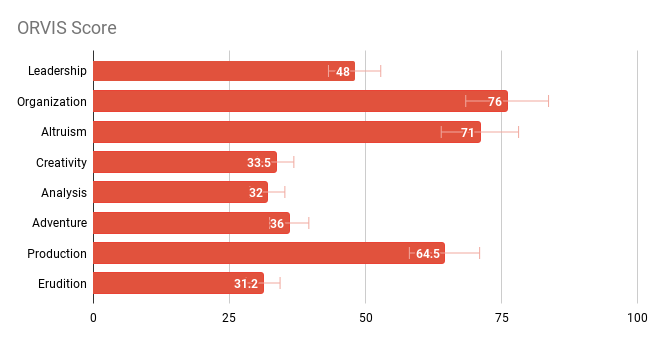Beginner’s Guide To Power Skills
Power Skills leverages author text or audio to extract competencies indicative of future professionals. Through natural language processing, we distill the extracted insights into robust competencies for the future professional.
Annually, the World Economic Forum (WEF) shes the key competencies in The Future of Jobs report. We compile these core competencies and, in collaboration with experienced psychologists, refine these essential skills further.
In addition to the 10 core competencies, we also offer socio-emotional competencies based on the OECD framework and individual vocational inclinations based on ORVIS. These frameworks are explained below.
Social and Emotional Skills (OECD)
Based on OECD research on Social and Emotional Skills, we have integrated this framework into the concept of Power Skills.
These skills are critical for people’s ability to adapt to their environment and achieve their goals throughout life. Their development not only contributes to individual well-being but also to the well-being of communities and society as a whole.

The OECD has identified and divided these socioemotional competencies into six categories:
-
Task Performance:
- Refers to behaviour that contributes to the production of goods or the provision of a service.
- Organizational citizenship behaviour benefits the organization, such as persisting in time-consuming tasks or providing personal support to colleagues.
- Counterproductive work behaviour refers to intentional actions harmful to the organization, such as absenteeism, insults, theft, or involvement with substances.
- Conscientiousness, with the highest correlation, is highlighted as key for all work performance criteria.
-
Emotional Regulation:
- Refers to the ability to regulate and control one’s own emotions.
- Involves the recognition, understanding, and adaptive and constructive management of emotions.
- Individuals with good emotional regulation effectively handle challenging situations while maintaining emotional balance.
-
Collaboration:
- Involves working together with others to achieve a common goal.
- Requires cooperation and contribution from different individuals to reach a shared objective.
- Applies in various contexts, such as work, education, and community projects.
-
Open-Mindedness:
- Refers to the willingness to consider new ideas, perspectives, or information without prejudice.
- Involves exploring different points of view and accepting the diversity of thoughts.
-
Engaging with Others:
- Refers to the ability to actively engage in social interactions in a constructive manner.
- Includes effective communication, attentive listening, empathy, and positive collaboration to develop healthy relationships.
-
Compound Skills:
- Are combinations of two or more individual skills, forming a more complex skill.
- An example is self-efficacy, combining skills from the conscientiousness, emotional stability, and extraversion categories of the Big Five model.
- These compound skills are useful for understanding complex aspects of behaviour, capturing the interaction and interdependence of individual skills.
These socioemotional competencies, when integrated into the concept of Power Skills, provide a comprehensive and accurate view of people’s social and emotional capabilities, being essential for addressing complex situations that require a combination of these skills.
Oregon Vocational Interest Scales
The Oregon Vocational Interest Scales (ORVIS) functions as a robust career assessment tool designed to gauge an individual’s interests across various occupations and work environments. Widely utilized by human resources professionals, career counselors, and experts in career development, ORVIS assists individuals in exploring career paths that resonate with their specific interests and preferences.
Vocational interests signify the types of professions that capture one’s interest, constituting a crucial facet of individual differences that only partially intersects with ability or personality domains. Determining vocational fit involves aligning a profession with one’s personality. The Oregon Vocational Interest Scales (ORVIS) offers an excellent avenue for identifying this fit, boasting a well-crafted design and accessibility (it’s free, whereas many other scales require a fee).
By analyzing an individual’s responses to ORVIS questions, it becomes possible to generate a comprehensive report and offer recommendations for potential careers aligned with their interests. Moreover, ORVIS provides valuable insights into an individual’s personality, shedding light on how it may influence interpersonal dynamics within the workplace.
Dimensions of the ORVIS
The Oregon Vocational Interest Scales (ORVIS) systematically assesses eight distinct dimensions of vocational interest, each shedding light on an individual’s inclination towards particular aspects of work. These dimensions encompass Leadership, Organization, Altruism, Creativity, Analysis, Producing, Adventuring, and Erudition. It is important to note that the ORVIS offers insights into a spectrum of careers that align with an individual’s personality rather than prescribing a specific job. This is partly due to the fact that the ultimate career choice is contingent upon a combination of skills and educational qualifications.
Several categories within the ORVIS exhibit correlations with the Big Five personality traits. Specifically, the job types identified in the Realistic, Investigative, Artistic, Social, Enterprising, and Conventional (RIASEC) model align closely with the ORVIS, except for the final category of Erudition. Despite having been conceptualized by different authors, the Holland’s scales and the ORVIS demonstrate a noteworthy overlap in their structures, with variations primarily arising from distinct category labels.
Both the ORVIS and the RIASEC model, recognized for their reliability and validity, are extensively employed tools in aiding individuals to explore diverse career options and make informed decisions about their future.

-
Leadership: Occupations involving leading and directing people.
-
Organization: Occupations requiring the organization of substantial amounts of data or materials.
-
Altruism: Occupations involving assisting and supporting others.
-
Creativity: Occupations involving the creation of various products.
-
Analysis: Occupations centered on the analysis of information.
-
Adventure: Occupations involving adventurous and engaging experiences.
-
Production: Occupations involving the construction or production of tangible items.
-
Erudition: Occupations centered on acquiring knowledge across diverse topics.
The Big Five Personality Traits
Information about the Big Five can be found on the Persona Predict page.